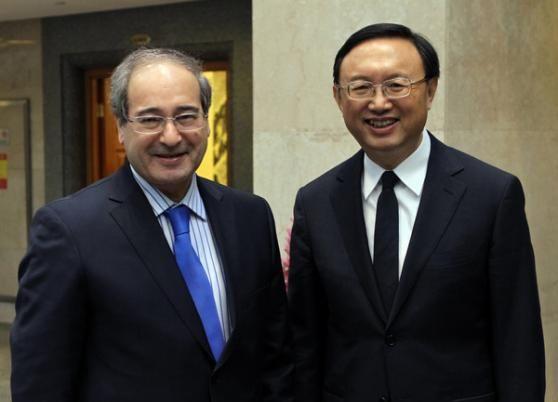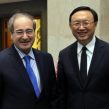
China criticizes American action on Syria, but shows little interest in the result
Publication: China Brief Volume: 13 Issue: 18
By:

In the telling of China’s official media, the proposed U.S. strike on Syria is a war in search of a pretext, yet another instance in a line of American aggression running from James K. Polk through George W. Bush and into the present administration (People’s Daily Online, September 9). In truth, the real target of the campaign is not Syria but Iran, People’s University Professor Yan Jincong said in an interview with the People’s Daily, and while the current chemical weapons talks may delay the strike, they cannot prevent it (September 12).
China has been intensely critical of proposed U.S. military action in Syria, and the crisis has pitted the country against China and Russia in a political standoff. However, unlike Russia, China does not appear to believe that it has any direct interests in the issue, and seems more concerned with upholding the principle of unlimited sovereignty in internal affairs and protecting its own reputation. The Chinese government has attempted to portray itself as a neutral party interested only in finding a political resolution, and it seems to be doing so more effectively than in its response to previous Arab Spring conflicts. While both China and Russia are consistent opponents of American military intervention, this issue demonstrates that they are not a “bloc”—in fact, based on their actions and rhetoric on Syria, their perspectives seem to be farther apart than ever. Russia appears to view Syria as a square in a global game of chess played between it and the United States, and has placed itself firmly behind the incumbent Assad regime, attempting to influence the outcome of the civil war through arms sales, and sending warships to the coast of Syria in an apparent response to the threat of U.S. attack. China, meanwhile, has made efforts to frame its opposition to the strike as constructive criticism, with President Xi Jinping reportedly taking aside Barack Obama at the recent G20 meeting to tell him that “a political solution is the only way to solve the conflict, and that a military strike cannot solve the problem’s root causes”(Xinhua, September 7).
China’s official media coverage has framed the issue as a debate between the United States and Russia, with China a (sternly critical) bystander. A People’s Daily report on the crisis’s effect on “Great Power relations” mentioned China only briefly in the context of energy security, while “World Cube” (Huanqiu Lifangwei) a new Xinhua daily foreign affairs channel, listed Russia and Iran as the main countries supporting the Syrian regime (People’s Daily, September 10; Xinhua World Cube, September 9). China’s famous hawk commentators Luo Yuan and Dai Xu have not appeared in stories on Syria.
Official statements from the foreign ministry have avoided highly quotable denunciations, but Foreign Ministry spokesman Hong Lei has repeatedly stressed China’s view that intervention without the approval of the UN Security Council is “against international law and the basic norms of international relations” (Xinhua, September 11). Meanwhile, media directed at an internal audience have depicted the United States as an aggressor with a history of manufacturing pretexts to invade foreign countries—one article reprinted in People’s Daily Online compares the Syrian crisis to the 2003 invasion of Iraq, the Spanish-American War and the Mexican-American War, complete with pictures of Presidents George W. Bush, William McKinley and James K. Polk (People’s Daily Online, September 9). They have also heavily criticized the U.S. decision-making process, describing Obama’s approach as “getting on the bus first and buying the ticket later,” and, in the inimitable Global Times, complaining that “the United States is giving a strike no more thought than cracking a walnut (People’s Daily Online, September 9; Global Times, August 30).
But China has not come out as a strong supporter of Syrian president Bashar al-Assad. As the U.S. Congress debated the strike, China received a delegation from a Syrian group called the National Dialogue Forum, which it described as a representative of Syria’s non-violent opposition, highlighting the visit at the September 10 Foreign Ministry Press Conference (Xinhua, September 10). This stands in sharp contrast to China’s vocal support of the incumbent governments in the civil wars in Libya and Sudan a few years ago, and suggests that China’s foreign policy apparatus has learned a lesson. In Libya and Sudan, China became identified with the regime, forcing it to scramble to establish ties with the new governments of Libya and South Sudan in order to protect its economic interests in those countries. With Syria, China appears to be trying to hedge its bets.
Nor does there appear to be an official line on the fate of the Assad regime itself. In contrast to the Libyan and Egyptian revolutions, during which Chinese official media went to great lengths to depict the opposition as disorganized and illegitimate rabble, Chinese media have given the course of the Syrian war bland and neutral coverage, while praising calls for negotiation from both sides at different points (Xinhua, February 11, August 5). There has been little commentary on the fate of Bashir al-Assad, and what there is does not suggest official instructions—it ranges from warnings about the bloodthirstiness of the rebels to a surprising suggestion in the China Youth Daily that, while fighting the West might “display his personal heroism,” Assad should step down to spare his people further suffering (Xinhua, August 4; China Youth Daily, September 7).
While China remains firmly opposed to almost all military intervention in internal conflicts, its actions and rhetoric on Syria are, if anything, milder than in recent comparable events. The substantial gap between China’s approach and Russia’s should give pause to analysts inclined to describe the two countries as a bloc, and suggests that China is not especially concerned with preventing a strike, but rather with establishing norms that it can call upon to reject international intervention in a conflict in Tibet, Xinjiang or Taiwan.





